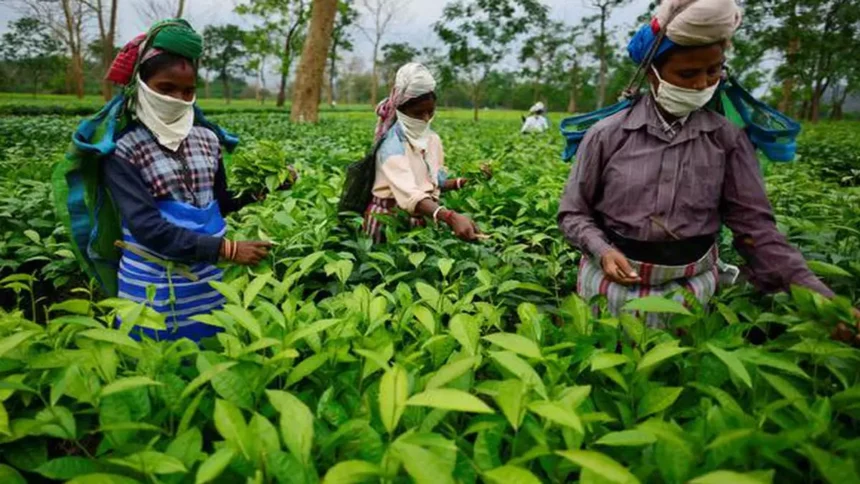Main Points In Hindi (मुख्य बातें – हिंदी में)
-
पश्चिम एशिया में तनाव का प्रभाव: ईरान-इजरायल तनाव के चलते कोच्चि चाय नीलामी बाजार में विदेशी खरीदारों की मांग में गिरावट आई है, जिससे चाय की कीमतों पर नकारात्मक प्रभाव पड़ा है।
-
बाजार में कमी: निर्यातकों ने बताया कि पिछले कुछ हफ्तों में विदेशी खरीदारी में कमी रही है, जिसके कारण नीलामी मंच पर ऑर्डर कम हो गए हैं और कई खरीदार अब ऑर्डर देने में हिचकिचा रहे हैं।
-
ईरान और इराक का संकट: ईरान और इराक, जो दक्षिण भारतीय चाय के प्रमुख खरीदार हैं, इस स्थिति से प्रभावित हुए हैं, जिससे देरी से भुगतान और बढ़ती माल ढुलाई लागत के डर से निर्यातक ऑर्डर देने में झिझक रहे हैं।
-
चाय की कीमतों में वृद्धि: चाय की मौजूदा ऊंची कीमतें पिछले कुछ महीनों में लगभग 60 प्रतिशत बढ़ गई हैं, जिसके कारण निर्यातक व्यापारिक ऑर्डर उत्पन्न करने में असमर्थ हैं।
- बिक्री और गुणवत्ता का असर: कोच्चि की नीलामी में ऑर्थोडॉक्स चाय की बिक्री 74% ही हुई, जबकि बारिश के कारण अत्यधिक फसल की आवक ने चाय की गुणवत्ता को प्रभावित किया है।
Main Points In English(मुख्य बातें – अंग्रेज़ी में)
Here are the main points from the article:
-
Impact of Geopolitical Tensions: The ongoing tensions in West Asia, particularly due to the Iran-Israel standoff, have negatively affected the Kochi tea auction market, leading to reduced foreign buyer activity.
-
Decrease in Foreign Orders: Exporters have reported a decline in foreign purchases over the past few weeks, resulting in significant price impacts on beverages. Many buyers are hesitant to place orders due to the adverse situation in the region.
-
Price and Quality Issues: The current high prices of tea, which have increased by nearly 60% in recent months, and adverse weather conditions affecting crop quality have contributed to a decrease in export orders.
-
Market Conditions: Orthodox tea sales at the Kochi auction saw only 74% of total sales, with prices for whole and broken leaves dropping significantly. The average price realization also faced a decline.
- Potential Market Shifts: While the situation poses challenges, there could be a silver lining as it may open up opportunities in the Russian and CIS markets, even though they are not as large as the current buyers from Iran and Iraq.


Complete News In Hindi(पूरी खबर – हिंदी में)
ऐसा प्रतीत होता है कि ईरान-इजरायल गतिरोध के बाद पश्चिम एशिया में बढ़ते तनाव का असर कोच्चि चाय नीलामी बाजार पर पड़ा है, जहां विदेशी खरीदारों की ओर से सुस्ती देखी जा रही है।
एक निर्यातक ने बताया व्यवसाय लाइन पिछले पखवाड़े में विदेशी खरीदारी में मंदी रही, जिससे पेय पदार्थों की कीमतें बुरी तरह प्रभावित हुईं। पश्चिम एशिया में बिगड़ती स्थिति के कारण कई खरीदार अब ऑर्डर देने में अनिच्छुक हैं, जिसके परिणामस्वरूप नीलामी मंच पर ऑर्डर घट रहे हैं।
ईरान और इराक दक्षिण भारतीय चाय के प्रमुख खरीदार हैं और ये दोनों बाजार मौजूदा संकट से प्रभावित हुए हैं। कई शिपर्स देरी से भुगतान और बढ़ती माल ढुलाई लागत के डर से ऑर्डर देने से झिझक रहे हैं। निर्यातक ने कहा, अगर संकट गहराया तो कीमतों में और गिरावट आ सकती है। लेकिन उन्हें लगा कि यह स्थिति एक वरदान साबित हो सकती है क्योंकि इससे रूस और सीआईएस देशों में बाजार खुल सकते हैं, भले ही वे ईरान-इराक जितने बड़े खरीदार न हों।
योगदान कारक
साउथ इंडिया टी एक्सपोर्टर्स एसोसिएशन के अध्यक्ष दीपक शाह ने कहा कि न केवल पश्चिम एशियाई देशों में तनाव, बल्कि चाय की मौजूदा ऊंची कीमतें भी एक योगदान कारक है, जो पिछले कुछ महीनों में लगभग 60 प्रतिशत बढ़ गई है। चाय की घटती खेप के लिए। कोई भी निर्यातक इन मौजूदा कीमतों पर कोई व्यावसायिक ऑर्डर उत्पन्न नहीं कर सका।
इसके अलावा, बारिश के कारण नीलामी मंच पर अत्यधिक फसल की आवक हुई है और इससे चाय की गुणवत्ता प्रभावित हुई है। उन्होंने कहा कि इन सभी कारकों के कारण निर्यात ऑर्डर में गिरावट आई है।
इस बीच, कोच्चि की नीलामी में ऑर्थोडॉक्स पत्तों की बिक्री 42 की मात्रा 3,79,653 किलोग्राम थी और बाजार में केवल 74 प्रतिशत बिक्री देखी गई। साबुत पत्ती और टूटे हुए पत्तों की कीमतें 5-10 रुपये प्रति किलोग्राम के लंबे अंतर से कम थीं और कभी-कभी इससे भी अधिक और इसमें कुछ निकासी भी देखी गई। नीलामीकर्ता फोर्ब्स, इवार्ट और फिगिस ने कहा कि औसत मूल्य प्राप्ति भी ₹16 घटकर ₹185 रह गई।
सीटीसी डस्ट की कीमतें भी विशेष रूप से उच्च कीमत वाली चाय के लिए 3-4 रुपये प्रति किलोग्राम कम थीं और बहुत अधिक निकासी देखी गई। औसत मूल्य प्राप्ति ₹4 घटकर ₹163 रह गई।
Complete News In English(पूरी खबर – अंग्रेज़ी में)
It seems that the increasing tensions in West Asia, particularly following the Iran-Israel standoff, have impacted the tea auction market in Kochi. There has been a noticeable decrease in foreign buyers during recent auctions.
An exporter mentioned to Business Line that foreign purchases dropped last week, adversely affecting tea prices. Due to the worsening situation in West Asia, many buyers are hesitant to place orders, leading to a decline in auction participation.


Iran and Iraq are significant buyers of South Indian tea, and both markets are currently affected by the ongoing crisis. Many shippers are cautious about placing orders due to fears of delayed payments and rising shipping costs. The exporter warned that if the crisis worsens, prices may decline further, although it could also open up opportunities in markets like Russia and CIS countries, even if they are not as large as Iran and Iraq.
Dipak Shah, president of the South India Tea Exporters Association, stated that the tension in West Asian countries, along with the current high prices of tea—which have risen by around 60% over recent months—are significant factors affecting exports. None of the exporters could secure any business orders at these current prices.
Additionally, excessive rainfall has led to high crop inflow at auction platforms, affecting the quality of the tea. He noted that all these factors have contributed to a decline in export orders.
Meanwhile, in the Kochi auction, the sale of orthodox tea reached 379,653 kilograms, with only 74% of it sold. Prices for whole and broken leaves were significantly lower by Rs 5-10 per kilogram, with some even lower, leading to noticeable withdrawals. Auctioneers like Forbes, Ewart, and Figis reported an average price drop to Rs 185, down by Rs 16.
Similarly, the prices for CTC dust tea also fell, particularly for higher-priced varieties, dropping by Rs 3-4 per kilogram, with many withdrawals recorded. The average price for CTC dust decreased to Rs 163, down by Rs 4.








